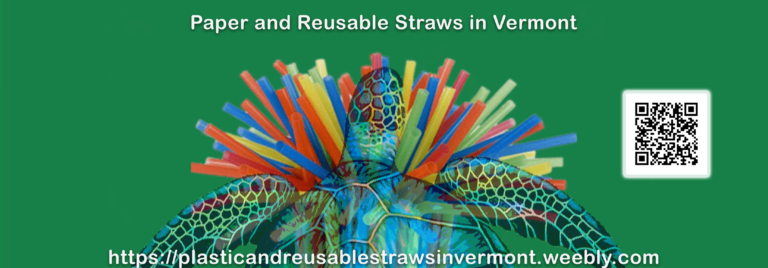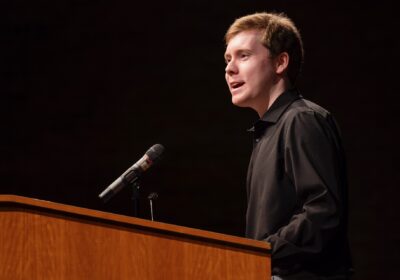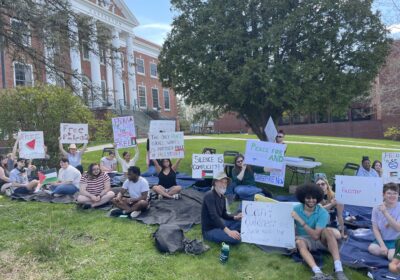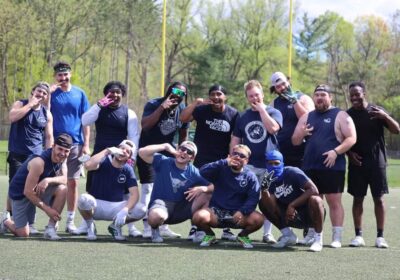Q&A – Dean Galle
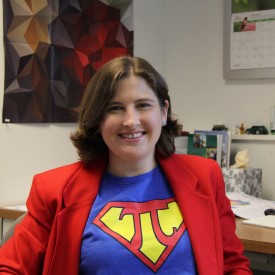
Gillian Galle is an associate academic dean at Castleton University. She grew up in New York, went to school in New Hampshire, and taught in New York City before living in Vermont. After many years as a mathematics professor, she has moved up to an administrative position helping teachers with online learning and anything students might need.
Q. Why did you choose Castleton?
A. So once upon a time, I was a graduate student at the University of New Hampshire, and while I was there, I made the acquaintance of Susan Generazzo, who was also in the same PhD program I was in. And so, she was a few years ahead of me. She graduated. She went out job hunting, and she found this job at a little place called Castleton, in Vermont. She just kept telling me all these things like how much she loved working with the students and how awesome it was to work with her coworkers and just what a great area this was.
And so, I finished up my degree. I then tried to find a job – didn’t really get anywhere, so I ended up in a post doctorate. And about a week or two after giving a verbal agreement to take on the postdoc, I got this email from Sue, Dr. Generazzo, and it said that they had a position opening at Castleton in the math department and I’m like, noooooo, because I just agreed to go elsewhere. If I knew then what I know now, I would have probably broken my verbal agreement and put in my application right then, but you know, I followed what I said I was going to do. Did a year there, decided I didn’t really love it enough to stay for a second year.
I happened to look up whether or not Castleton still had that position in the math department open. And what do you know? It was, it was practically Kismet. It was just waiting for me so I applied. And I was very excited when I got here, I mean just the transition from Brooklyn to Vermont visually. It almost hurt when I got out of the car and it’s just so green out here in Vermont.
Q. What’s your favorite class to teach and why?
A. I have a real soft spot for Calculus I, and that that’s kind of my sweet spot. It’s this exciting blend of taking all the math that you kind of knew and understood, and then adding a layer of interesting concepts on it, which I won’t lie, some of them are tough concepts. I mean, that is why calculus gets a bad reputation because it’s asking you to work with things that aren’t as tangible.
Plus, I don’t know, I suspect that calculus is probably where I started to really love math just seeing how some of the pieces fit together.
Q. What specific challenges are you facing with online learning and COVID?
A. All my family is in New York and big red counties I haven’t seen them in months. And so that’s been hard, because I like my family. There’s that support network that’s there, but it’s stretched thin.
Recently, my big thing that’s keeping me up at night is, in all of my meetings, we spend a lot of time talking about the students, which is important. You all are literally the reason we all get together and come do things every day because you’re the fun part. You’re the reason we decided to become professors and share our knowledge, or as administrators you are the reason that we got the educators to come together to teach you. We’ve been doing an all right job trying to keep morale up for ourselves. Like Halloween, we encouraged as many people as possible the dress up.
I’ve been working with [professors] since we hit the ground in March last year because I was working on a team with Chris Boettcher – head of director of the Center for Teaching and Learning – and Sara Chambers – from educational technologies – and we were working on helping the faculty make more use of Canvas. And then all of a sudden, the pandemic hit. And it’s like, okay, remember how we said we’re gonna help you work on Canvas? Well, now you’re gonna do it all in about a week, and that’s the rest of our semester. Go.
It’s really just sort of been finding ways to help and support all of us, and when I stop and think about what our faculty has taken on. It literally kind of takes my breath away. I worry about finding ways to help them feel supported because they aren’t coming to campus; most of them are working from home. They’re staying safe. They’re doing their best to meet student needs.
They build the community within their classrooms, so the students feel like they have each other or at least feel like they’re mingling with people. I don’t feel like we have as many opportunities to make the faculty still feel like they are [a] community. That they are together in entity. And that’s probably the biggest thing that’s been worrying me recently is finding a way to morale boost and support them and just let them know how proud I am of them.
My other tough part is like, I miss my students. I miss teaching. I miss those interactions.
Q. Besides mathematics, what is something that you love learning about?
A. I’ve been doing a lot of learning about birds ever since I got to Vermont. My bird-watching game has stepped up. I mean I used to think I was pretty good because I could recognize a cardinal, but now I can recognize 20 to 30 different birds that are frequent visitors in my backyard so that’s that’s cool, discovering it there’s a whole wide variety of birds that I just didn’t even know existed.
I’ve been working on meditation. I’ve been learning to incorporate that because that’s been a very positive influence since all of this started. And, I’d say I learned stuff in knitting but it’s kind of hard to quantify that because like, I know how to knit, but I find new patterns and techniques and things that I’m like oh, look at this.
Oh, and pedagogy. I am learning a lot more about online pedagogy and instructional design than I ever thought I would.
Q. Who has influenced you the most in your professional career?
A. There are so many people that are a part of how I got here. I would like to thank my parents. Okay, for starters that sounds a little – it sounds a little cliché – but honestly, growing up, it never occurred to me that there was anything I couldn’t do.
I didn’t start in math. I started in computer science at the Rochester Institute of Technology and it was about three years into that degree, at the last minute they swapped the professor for a class I was supposed to take. This doesn’t sound like a big deal, right? Except, if it had stayed as the originally scheduled Professor, Hans Peter Bischof, I probably would have done all right in the course, and I would have probably kept going in computer science. But they switched it out to Dr. Ken Reek, who was just this brilliant computer science person, like the way his mind worked was incredible, but I couldn’t follow it. I did not understand the connections that we were making, and that was probably the first course I had ever dropped academically.
And this happened at the same time as me figuring out, I should get a minor. You know what’s a good minor? Mathematics is a great minor! I’m unhappy with the computer science class, and really feeling bad about that, but I like math. Hey, do you think it’s possible, is there a math major? Is that a thing? And sure enough, there was. And so, I suppose in some ways, Dr. Ken Reek was a very important part of how I came here because I was going to fail that class. Until I turned and embraced mathematics instead.
So, I did the bachelor’s degree, finished in math, but you know you’re coming up on that last year of the degree and it’s like what are you gonna do when you graduate? I’m like, oh geez, I don’t know. Um, oh look! There’s this bachelor’s, master’s program right here this school. If I stay for an extra year and take some more graduate level courses, then I get another degree. Yes, let’s do that.
I promise this story is going somewhere.
You know, I’m graduating and everybody’s patting me on the back and I’ve got my fancy hood and regalia and they’re like, well what are you going to do now? I think teaching at like a community college would be cool because then I could keep doing this. And they said well hey, we have some lecturer positions here, why don’t you apply and teach here for a bit? And so, I did. And this was great.
I mean, it was terrifying the first time I got up in front of a room of people because most of my students are taller than me. It’s a technology school, it’s Rochester Institute of Technology, so they are also predominantly male. I can still remember standing behind the podium on the first day and feeling my hands lightly tremble and sweat, but I’m holding them behind the podium so nobody can see that I’m terrified that somebody’s going to stand up and say, who are you to be our teacher?
Back on track.
One of my former professors was Alejandro Engel. And so, I had just figured out that there was a branch of study called mathematics education, and I was talking about that and he’s like, oh no no no no, dismisses the whole education part of the teaching math, pure mathematics. And you know, really, I was as smart as this other grad student that was in my cohort. I should go to Duke, like Kevin did. And like, I don’t think I want to do that. But just hearing him push back against the mathematics education part, sort of pushed me in that direction.
And so, with everybody’s assistance, I did the best thing I could to sabotage myself, and I applied to one. One grad school. This way, I could tell them that I applied to grad school, because they all encouraged me to do so and, oh no I didn’t get in, I guess I’ll stick around here for another year. Except the plan backfired. I got accepted, and then I moved to New Hampshire.
And then in grad school, my thesis advisor – my dissertation advisor was probably the next big influence. He was Tim Fukawa-Connelly. I mean he taught me a lot about the world of research and being comfortable with being uncomfortable because you go to these conferences and you’re surrounded by lots of people you don’t know, but if you can accept that you’re not going to feel 100% comfortable because you’re being pushed out of your comfort zone to think about different things to meet new people, then you end up having all these great experiences. But it’s really hard that first time to go to that.
Q. You enjoy hiking and have climbed all twelve peaks on the Appalachian trail, is there a summit that you want to climb next?
A. So recently, my husband and I worked on doing all the mountains in Vermont that were over 4,000 feet. And I think we finally bagged all of them. Really what drove me in the 12 peaks was the patch. I’m not gonna lie. The fact that I could order a patch to put on a shirt at the end of it, so I can be like, I did that. So, I did a Google search and there are a variety of different weird little patches, you can get for all sorts of things.
So, I’ve got a couple different lists, but I think the next one we’re sort of eyeballing is – I mean we’re pretty close to the Adirondacks right, and so checking out the Adirondack peaks. It’s the Adirondacks 46ers. Yeah. There are 46 peaks in the Adirondacks. I mean there’s probably more mountains, but these are like the known ones that if you do all of them there’s another patch involved.
Q. If you could be taught by one teacher for a class who would it be and why? What would you want to learn from them?
A. There’s so many things I want to learn and so many weird things that I found other people can teach me about. Like on my to-do list is to have Professor Flo Keyes teach me about preserves and jam making. Recently, Professor Keyes and I have been talking about that we were going to do it this summer but then you know, COVID put the kibosh on that. So yes, I have a class with Professor Keyes.
I had this student, and she was showing off – in a positive way – spinning. So, like spinning your own yarn, sort of thing. It’s [Rowie] Budde.
And so, I might start with my little sister, who knows how to spin using the wheels, so my little sister can teach me about that. But then Rowie is going to teach me about the drop spindle stuff because I feel like that’s far easier for me to like carry a little bag with me, and then you know, for a few minutes in the office if I just need to de stress.
My needs are jam making and making my own yarn.
Q. Who would you want to play you in a movie about your life?
A. Well first off, I’m not sure anybody really wants to come see a movie about my life. Um, I don’t even know who looks like me, I don’t play that game.
See, that’s the thing, my voice is apparently a little higher than I think it is because we all hear voices lower than it actually comes out, so I feel like I need a better voice. I could definitely go with Morgan Freeman or Sam Elliott doing my voice, but maybe they’ll just do the narration, like the inner monologuing part. My immediate go to was Drew Barrymore because I could see that working. I think she’s got the flexibility. I don’t know what I’m talking about here. Yes, I think Drew Barrymore is probably where I’d go.
Q. What’s the most dangerous activity you’ve always wanted to try?
A. Hang gliding. I know that that was oddly very on top of it, but like, I thought about the skydiving thing, and that kind of horrifies me. I don’t think I could do that. I mean I’ve tried jumping off a platform that was like 20 feet above a lake, and that was really hard, but I feel like hang gliding, like, you’re strapped in, you sort of start with the parachute open, but you will just sort of get to like glide like an airplane. I think that would be awesome.
Q. Based on nothing at all, how long do you think you could last in a zombie apocalypse?
A. I don’t think I would actually last very long as a human. I’d like to say I would, but I feel like I’m kind of – I’m kind of weak. I feel like I would end up putting other people’s needs before my own, and so while I’m helping the little kid climb the fire escape to get up to that room that’s above where they are; I’m going to be the one that’s left behind and gets bitten.
But then, you know, once I’m a zombie, I’d probably do okay for a while. Because, I’m probably not going to be as aggressive in pursuing the humans in the meals because again, I’m putting other people’s needs before my own. The rest of the zombies are going to get top choice there, so they’re the ones that are going to get killed and, you know, destroyed because they’re actively pursuing them. Whereas, I’m someplace at the back of the crowd not quite sure what I’m doing.

